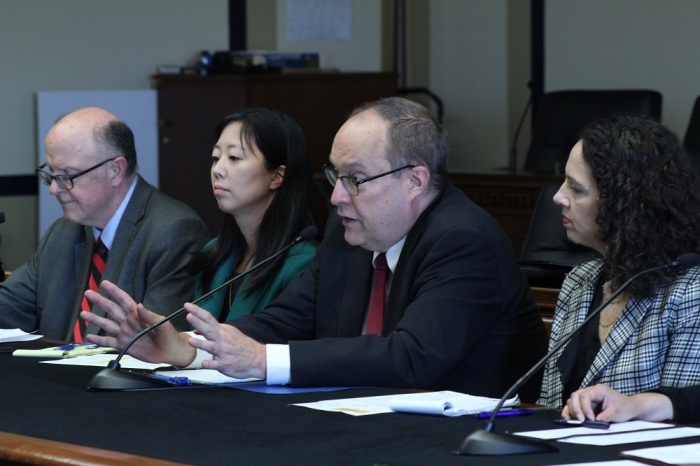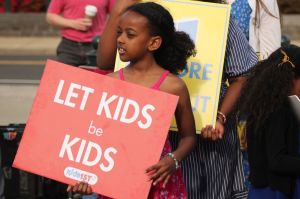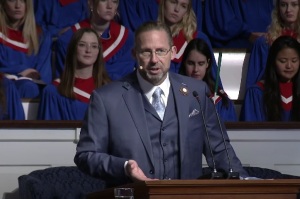US on track to resettle more refugees in 2019 but still too few, faith groups say
'We are effectively continuing their suffering overseas'

WASHINGTON — The United States is on pace to resettle slightly more refugees in fiscal year 2019 than it did in the previous year but faith-based refugee advocates are still pressing the U.S. to do much more to help people fleeing persecution across the globe.
As the administration touts international religious freedom as one of its core priorities in foreign policy, advocates told congressional staffers during a congressional briefing on Capitol Hill that the Donald Trump administration’s refugee resettlement policies are negatively impacting the state of religious freedom worldwide.
On the day before the U.S. State Department's second-annual Ministerial to Advance Religious Freedom, representatives from the nation’s leading faith-based refugee resettlement agencies challenged the Trump administration to put an end to its drastic reduction of the refugee resettlement program.
They warned that as the U.S. has cut refugee resettlement by over 66 percent from fiscal year 2016, other countries have followed the U.S.’ lead in closing their doors to refugees.
“At a time when we are seeing the largest numbers of people displaced around the world, we should be continuing to lead in resettling refugees and not closing the door to prevent refugees from coming here in the first place, especially when the administration has been advocating for persecuted religious minorities,” Jenny Yang, senior vice president for advocacy and policy at the evangelical refugee resettlement agency World Relief, said.
“But they have effectively shut the door on them to even come to the United States of America. We have to practice at home what we are teaching abroad. When we are not allowing refugees who have fled persecution to find hope here, then we are effectively continuing their suffering overseas.”
While World Relief and the other eight organizations authorized to resettle refugees in the U.S. have long spoken out about the Trump administration's cuts to refugee resettlement in the U.S., the Trump administration is quietly on track to resettle around 6,000 more refugees in fiscal year 2019 than it did in fiscal year 2018.
According to refugee processing data compiled by World Relief, the U.S. has already resettled at least 22,386 refugees in fiscal year 2019, which ends Sept. 30. By comparison, the U.S. resettled 22,491 refugees in fiscal year 2018.
According to World Relief, the humanitarian arm of the National Association of Evangelicals, the U.S. is on pace to resettle a total of 28,670 refugees by the end of the 2019 fiscal year. That number would fall just short of the Trump administration’s stated refugee resettlement ceiling of 30,000.
Although the number of resettled refugees appears to be on the incline from 2018, it still falls far short of the 95,000-refugee cap that World Relief and other refugee resettlement agencies have called for.
By comparison, nearly 85,000 refugees were resettled to the U.S. during the last full year of the Barack Obama administration.
“I think 2017-2018 was somewhat of an anomaly. Because when [Trump] took office, he had issued three executive orders that directly impacted the refugee resettlement program,” Yang told The Christian Post after the briefing. “Because of that, I think 2017-2018 were anomalies and what you are seeing this year would be a turn back to what would be maybe normal processing time without the executive orders impacting this program directly.”
Yang said that the data is still “concerning.”
“My sense from conversations within the White House thus far, I don’t think that they are considering necessarily increasing the number. All the discussions I have heard thus far is that they are going to drastically decrease the number,” she noted.
“So I think that is really troubling because if 30,000 even stays the same, it’s still an aberration from historic norms. We are wanting them to increase the numbers as much as they can and not have this be the standard norm that becomes what our responsibility is regarding refugees.”
The U.S. has historically resettled more refugees on an annual basis than the rest of the world combined. But in 2018, Canada resettled more refugees (just over 28,000) than the U.S. To Yang, that is a sign that the U.S. is not carrying its fair share.
“Even when you look at populations, Canada right now has a 10th of the population of the U.S. but they are resettling more refugees than we are,” she said. “So when we think about fair share, a lot of resettlement efforts would go to help our allies like Lebanon and Jordan, in which 15 to 20 percent of their population is made up of refugees.”
Elizabeth Cassidy, director of international law and policy for the U.S. Commission on International Religious Freedom, said that the president is supposed to take religious persecution into account when determining the annual refugee resettlement ceiling under the International Religious Freedom Act of 1998.
“Generally, it has averaged 75,000 to 95,000 per year for many years until the last few years,” she explained.
While World Relief and other organizations are calling for the Trump administration to increase the refugee ceiling to 95,000 per year, UNHCR reported earlier this year that just 92,000 refugees were resettled worldwide in 2018.
“If you look at the global resettlement trend, not only have the U.S. numbers declined but there has been a decline in the number of resettlement spots last year. Basically, a lot of that is due to the U.S. also being in a leadership role, which other countries are closing the door as well,” Yang told CP. “A lot of countries take our lead when it comes to small resettlement numbers.”
Pari Ibrahim, founder of the Free Yezidi Foundation, voiced concern over the fact that the U.S. resettled just five Yazidi refugees in fiscal year 2018 even though the U.S. outwardly acknowledged the fact that the Islamic State committed genocide against the Yazidis in Northern Iraq in 2014.
Thus far in fiscal year 2019, only 14 Yazidis have been resettled to the U.S.
“Many of us can not believe that a country like the United States with its resources, its stated public interest in religious freedom and its recognition of the genocide against my people can do so little in terms of resettling for our most urgent cases,” Ibrahim said.
“I would like to add that although ISIS has been militarily defeated, its ideology remains and sadly tens of thousands of ISIS members also remain in Iraq and Syria. Although ISIS does not control territory, their adherents remain an essential threat to the Yazidis.”
Melanie Nezer, senior vice president of public affairs for HIAS, the Jewish resettlement agency, voiced concern with the fact that the Lautenberg Program to resettle religious minority refugees from Iran has essentially been frozen under the Trump administration.
The Lautenberg Amendment was passed by Congress in 1990 and was originally designed to facilitate the resettlement of Jews and other minorities in the Soviet Union. But in 2004, the program was extended to help Jews, Christians, Zoroastrians and others persecuted in Muslim-majority Iran.
“For the last few years, that program has pretty much been frozen even though there are thousands of religious minorities in Iran that would like to get out,” Nezer said. “What is important about that program, it has always been small — no more than a few thousand a year from Iran — but it leaves the door open for fleeing persecution and gives them a direct connection with people’s ability to practice their faith openly.”
Nezer also voiced concern over the fact that fewer officers from the Department of Homeland Security are being sent overseas to interview refugee applicants.
“The U.S. refugee resettlement program does rely on a pipeline of refugees who’ve been interviewed and are ready for the process,” she explained. “The current administration has been sending a lot fewer officers out there. Every refugee has to be interviewed by a DHS officer. So when those officers no longer go out to the countries where refugees need resettlement from, it means there are fewer refugees ready to be resettled and that further undermines the program.”
While the Trump administration has placed more priority on providing humanitarian aid to persecuted religious minorities overseas, Cassidy noted that boosting humanitarian aid is not a “substitute” for refugee resettlement because many refugees have relocated to host countries where they are also persecuted for their faith.
“A number of refugee-hosting countries also have religious freedom issues, meaning that depending on the faith or belief a refugee comes from, they may still be under threat in a country of forced asylum,” Cassidy said. “Four of the top 10 refugee-hosting countries are on USCIRF’s Tier 1 or Tier 2 lists [of religious freedom violators]. Those are Turkey, Pakistan, Sudan and Iran.”
In 2016, the U.S. resettled 16,702 refugees from countries listed on Open Doors USA’s World Watch List of 50 countries where Christian face the greatest persecution. In fiscal year 2019, the U.S. is on pace to resettle about 5,830 refugees from those countries.
While there are over 25 million refugees across the globe today, the United Nations reports that about 1.4 million refugees will be in need of resettlement in 2020.
"For the United States to take even 100,000 of those refugees, they are still less than 10 percent of the world's refugee population [in need of resettelment], which we think is a fair share," Yang said.
Galen Carey, vice president of government affairs for the National Association of Evangelicals, commended the Trump administration for placing much focus on religious freedom. But he stressed that the changes brought to the U.S. refugee resettlement program during the Trump administration have been “distressing.”
“The sharp cutback in all refugee resettlement to the United States from the historic levels, it is a very drastic reduction. It has also involved a very systematic dismantling of the whole infrastructure that enables us to resettle refugees so effectively,” he said.
“As the numbers have dwindled of refugees being resettled, our ability to respond to future crises has also been hampered. As well there is a separate question of what happens to refugees who arrive and apply for asylum here and they are very disturbing changes taking place in this area.”
Follow Samuel Smith on Twitter: @IamSamSmith
or Facebook: SamuelSmithCP





























